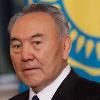(EurasiaNet) Kazakhstan is holding a snap, opposition-free presidential election on April 26 that should enable septuagenarian President Nursultan Nazarbayev to remain in power through the end of the decade.
The 74-year-old Nazarbayev has already ruled Kazakhstan for a quarter of a century. If he wins reelection as expected, he would be 80 when his next term ends in 2020. Some observers are cautioning that the ageing president’s continued rule is storing up political complications for the future.
The incumbent is universally expected to trounce little-known challengers, Turgun Syzdykov of the government-loyal Communist People’s Party of Kazakhstan and Abelgazi Kusainov, a member of the ruling party led by Nazarbayev, Nur Otan. […]
For Nargis Kassenova, director of the Central Asian Studies Center at Almaty’s KIMEP University, “the future is ridden with political risks whether he stays in power or decides to step down.”
While Nazarbayev remains in office, “there is a bigger possibility that the stagnation of the system will continue,” she told EurasiaNet.org. “With the closed off political space and lack of mechanisms and institutions for defining national and public interest, the country’s development will continue to be driven by vanity projects, and the creation of a genuine political community will be stalled.”
Read More © EurasiaNet
– – – – –
Also see:
Democracy in Kazakhstan and Uzbekistan is a managed affair, without clear rules of succession (The Economist)
The point of elections in Kazakhstan, says Nargis Kassenova of KIMEP University in Almaty, is not to contest ideas but to "demonstrate overwhelming support for the leader."











